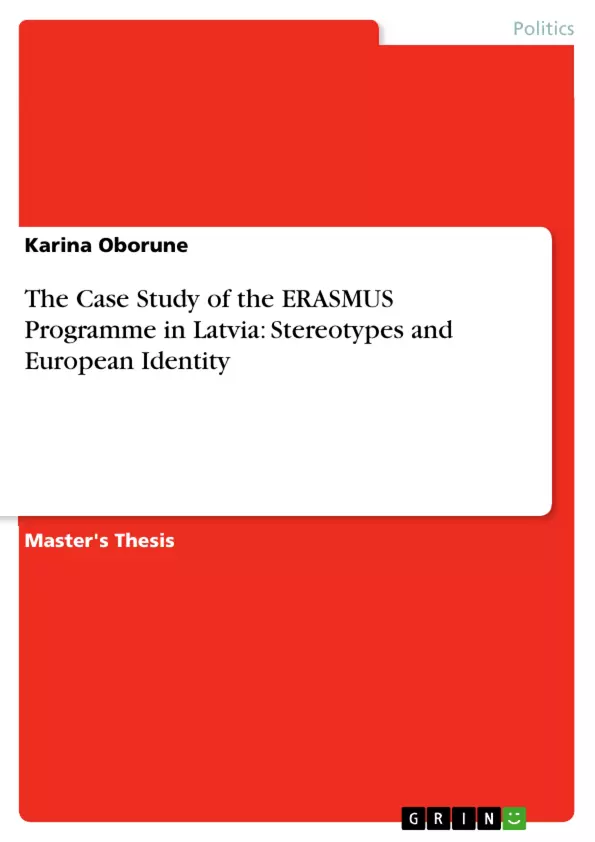The European Commission and scholars emphasize that the ERASMUS programme is
a successful example of European integration, a symbol of construction of European identity
and promoter of tolerance on the basis of breaking stereotypes, encouraging multicultural
experience and intercultural education. But because of the lack of empirical findings, this
Master thesis has been devoted to research of the impact of the ERASMUS programme on
breaking the stereotypes and fostering European identity. The quantitative survey of three
hundred thirty former ERASMUS, potential ERASMUS and non-ERASMUS students
provides partly justification that the ERASMUS Programme has impact on breaking the
stereotypes and promoting European identity. Potential ERASMUS students already have less
stereotypes and European self-identification than non-mobile students, therefore the
ERASMUS programme is rather catalyst than promoter of European identity and stereotypebreaker.
Key words: the ERASMUS programme, European identity, stereotypes.
Inhaltsverzeichnis (Table of Contents)
- INTRODUCTION
- CHAPTER 1: LITERATURE REVIEW
- 1.1. Identity
- 1.1.1. Typology
- 1.1.2. Collective vs. Individual Identity
- 1.1.3. Definition
- 1.2. Concept of European Identity
- 1.2.1. Limitations of concept
- 1.2.2. Political vs. Cultural Identity
- 1.2.3. National vs. European Identity
- 1.3. Stereotypes
- 1.3.1. Stereotypes vs. Prejudices
- 1.3.2. Typology
- 1.3.3. Heterostereotypes vs. Autostereotypes
- 1.1. Identity
- CHAPTER 2: METHODOLOGICAL FRAMEWORK
- 2.1. Survey Methodology
- 2.2. Questionnaire Design
- 2.3. Measurement
- 2.3.1. A Socio-Demographic Data
- 2.3.2. Indexes
- 2.3.3. Characteristics
- CHAPTER 3: ANALYSIS OF SURVEY
- 3.1. A Socio-Demographic Data
- 3.2. Indexes
- 3.3. Characteristics
- DISCUSSION
Zielsetzung und Themenschwerpunkte (Objectives and Key Themes)
The thesis examines the impact of the ERASMUS programme on breaking stereotypes and fostering European identity. The study aims to provide empirical evidence for the effectiveness of the programme in promoting intercultural understanding and reducing prejudice among participants.
- The role of the ERASMUS programme in European integration
- The concept of European identity and its relationship to national identities
- The impact of stereotypes on individual perceptions and attitudes
- The potential of intercultural exchange programmes to break down stereotypes
- The effectiveness of the ERASMUS programme in promoting European self-identification.
Zusammenfassung der Kapitel (Chapter Summaries)
Chapter 1 reviews the literature on identity, European identity, and stereotypes. The chapter explores different typologies of identity, the distinction between individual and collective identities, and the concept of European identity, including its limitations. It further analyzes the concept of stereotypes, distinguishes them from prejudices, and discusses various typologies of stereotypes.
Chapter 2 focuses on the methodological framework used in the study. It outlines the survey methodology employed, the design of the questionnaire, and the measurement strategies for collecting data on socio-demographic characteristics, indexes related to stereotypes and European identity, and other relevant characteristics.
Chapter 3 presents the analysis of the survey data. It analyzes socio-demographic characteristics of the respondents, examines the indexes related to stereotypes and European identity, and explores the relationship between these variables.
Schlüsselwörter (Keywords)
The main keywords and focus topics of this thesis include the ERASMUS programme, European identity, stereotypes, intercultural exchange, survey methodology, and quantitative research. The study explores the impact of the ERASMUS programme on breaking stereotypes and fostering European identity among students in Latvia, providing empirical insights into the relationship between mobility experiences and identity formation.
- Arbeit zitieren
- Karina Oborune (Autor:in), 2010, The Case Study of the ERASMUS Programme in Latvia: Stereotypes and European Identity, München, GRIN Verlag, https://www.hausarbeiten.de/document/162865


